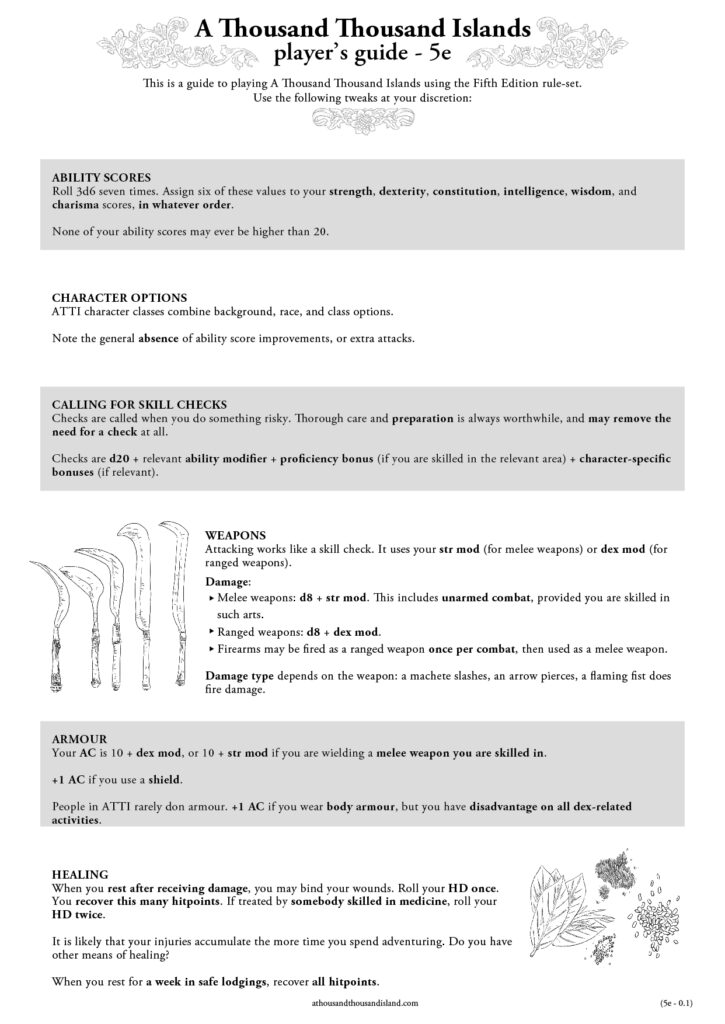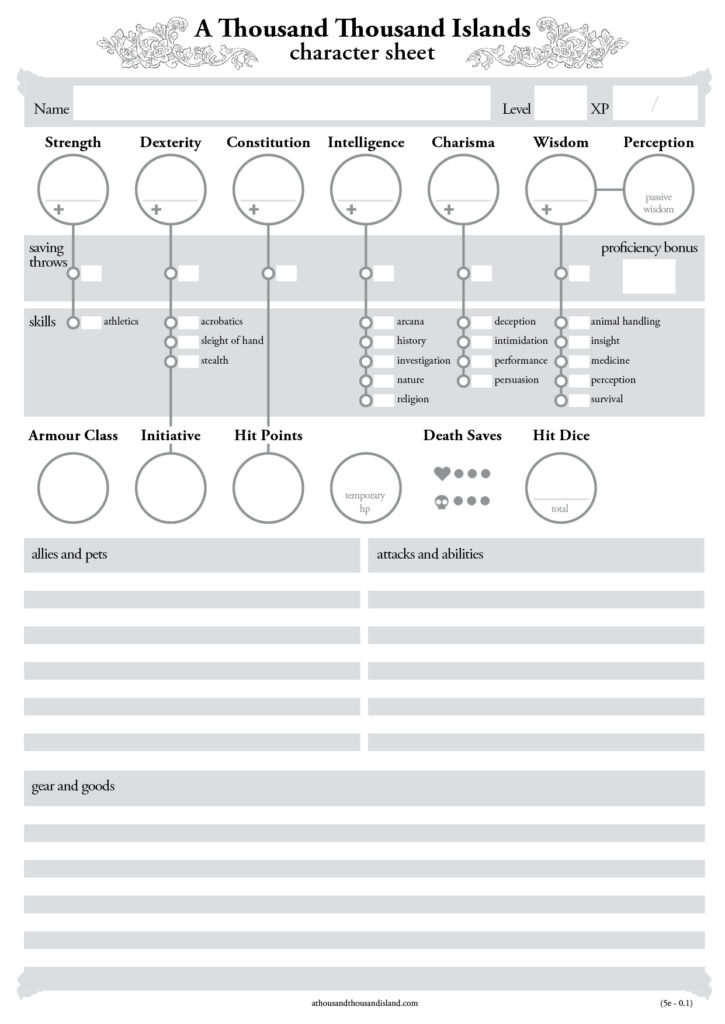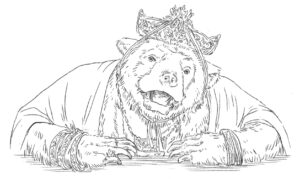This is something we’ve wanted to do for a while: A THOUSAND THOUSAND ISLANDS-specific rules, play-aids, and adventures, designed for various roleplaying-game systems.
All free to download. Thank you, RPG community, for being so welcoming to us.


Here are some player-facing house rules for exploring the world of A THOUSAND THOUSAND ISLANDS using 5E rules, as well as a handy character sheet. (You know which which 5th Edition we’re talking about.) Download them here:
5E HOUSE RULES
5E CHARACTER SHEET
Zedeck’s Design Notes — House Rules:
The ATTI zines are system-neutral. When people do ask us about system, “Can I use your zines with D&D?” is the question we get most often. Starting with 5E made sense.
Plus: one of our endgame goals is to create a bespoke tabletop RPG system for ATTI; this will probably be an amalgam of stuff we like from other games. Consider these PDFs as the first step in Mun Kao & Zedeck’s Grand Tour Of RPG Systems We Want To Crib From.
This house rule document reflects my personal preferences vis a vis 5E. I generally dislike doing math; and where math is required I like such abstractions kept simple.
More importantly, it attempts to encourage the “mouthfeel” of ATTI:
- Less power, more skill — player characters in ATTI are closer to the human baseline. But what is a hero, but a normal person with art, luck, and allies? Being prepared and having friends will take you further than an ability score increase or a “+4 to initiative”-style feat ever could.
- Magic is natural — it is part of the human baseline. There is no distinction between the mystical and material, in ATTI. Magic is art is skill. A wok made with sufficient skill comes alive. A dancer, with enough flair, bends reality. (This facet is further explored in our 5E Character Classes.)
- War is art — in real-world silat practice, a sarong can be as deadly as a spear. In ATTI, all weapons do d8 damage. But that’s just abstracted damage. A sarong is not the same as a spear. You can bar a door with a spear; you can smother with a sarong.
- Skills matter — they are more than just bonuses to checks. A skill provides a player-character with useful gear (books of religious lore); a history (which monastery did you belong to?); kinship with fellow practitioners and factions (you get along with monks, but a rival order may hunt you).
- Gear matters — light, food and drink are essential. Armour is heavy in ATTI’s heat and humidity. Do you have the proper tools and medicines on you? You only have so many shoulders; you’ll need help carting around all your stuff. How will you pay your porters? How will you manage your caravan?
- Trade, not currency — there is no easy gp standard in ATTI. Value is attached to trade: to knowing what goods other communities might want. Convince buyers why they need the stuff you have, and why they should pay a high price. Find out what the local currency is!
- People matter — ATTI is an interconnected world. Every action (or inaction) has political / economic / ethical ripples. As player-characters advance, they must reckon with the ways their presence affects surrounding communities. (And, in ATTI, most things count as “people”.)
* A lot of the above is basically tweaking 5E towards the old-school style of RPG play: open-ended rules and mechanics; emphasis on the materiality of the imagined space; high trust between players. What can I say? I’m an OSR person, at heart.
** These house rules are player-facing — they primarily deal with stuff that directly affects player-characters. How we might handle NPCs in ATTI (ie: reaction tables, guidelines for stats and skills, etc) is something we are still figuring out, and will probably come in a separate PDF.
Mun Kao’s Design Notes — Character Sheet:
- This is not the full 5E character sheet but rather what we felt was relevant to ATTI’s purpose. I’m actually a fan of generic character sheets formats; top to bottom flow and aesthetics closer to a boring form. I personally feel the relative simplicity of form aesthetics help to give space for players to create.
- When Zedeck showed me Mothership’s character sheet, my mind was blown. UI/UX principles in a character sheet. What was a tedious scanning of the character sheet for information became intuitive.
- I tried to apply similar principles in this character sheet, having Ability Scores link to Skills and other relevant attributes.
- Gears, goods, pets, etc takes up half the page. As mentioned, these are important in ATTI and the character sheet has as much space given to it.
- This is a work in progress, basically our first step to exploring what we would eventually like for ATTI. Please do give any feedback you have about it, what you like in character sheets and ways to help us improve it.


5 Responses
Have a look at Mythras. Or Openquest.
If damage is all about skill then make it a function of skill. So in Mythras or Openquest, 0-25% skill 1d4, 26-50% 1d6 etc. In D&D type games, use the attack modifier as the base
This is good! I’m a big fan of striping systems back to only what is important.
I’m curious about your healing system as that was my biggest issue with 5e. Are your short rests overnight? By which I mean do you limit then to once per day? Also when do you allow players to recover HD?
I think my intent with the healing tweak was to forego the “HD is a currency you spend” mechanic altogether.
So the way I see the healing system is: whenever you take damage, if you rest and tend to those fresh wounds afterwards you can recover one (or two) HD’s worth of damage. *That’s it.* You can’t take successive rests; you’ve got to sustain more damage to recover more HP. (Ie: you are binding your *new* wounds.) This could be clearer, I think — if we ever revise this PDF I’d have to figure out how to tweak the wording.
BTW: I was also trying to avoid referencing mechanics like Short Rest / Long Rest, in these house rules (and the character classes) most everything is once per day.
That makes a lot of sense.
It’s tricky because in a houserule document if you don’t specify that something is different then people will assume that it hasn’t changed, hence me assuming you still used a pool of HD.